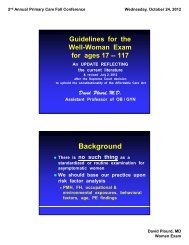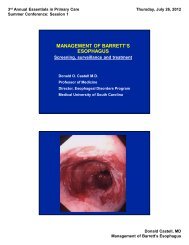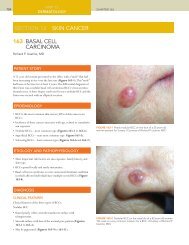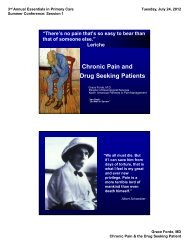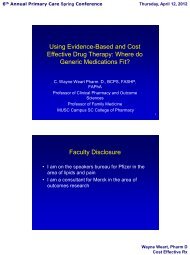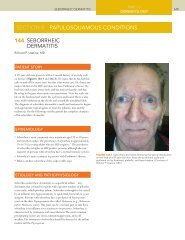New Drug Update 2010-2011 Faculty Disclaimer - CME Conferences
New Drug Update 2010-2011 Faculty Disclaimer - CME Conferences
New Drug Update 2010-2011 Faculty Disclaimer - CME Conferences
You also want an ePaper? Increase the reach of your titles
YUMPU automatically turns print PDFs into web optimized ePapers that Google loves.
2 nd Annual Essentials in Primary Care<br />
Fall Conference<br />
Friday, November 11, <strong>2011</strong><br />
Acetaminophen <strong>Update</strong><br />
January 13, <strong>2011</strong> FDA <strong>Drug</strong> Safety Communication: Prescription<br />
Acetaminophen Products to be Limited to 325 mg Per Dosage<br />
Unit - The FDA is asking drug manufacturers to limit the strength<br />
of acetaminophen in prescription drug products, which are<br />
predominantly combinations of acetaminophen and opioids. This<br />
action will limit the amount of acetaminophen in these products<br />
to 325 mg per tablet, capsule, or other dosage unit, making<br />
these products safer for patients.<br />
• In addition, a Boxed Warning highlighting the potential for<br />
severe liver injury and a Warning highlighting the potential for<br />
allergic reactions (e.g., swelling of the face, mouth, and<br />
throat, difficulty breathing, itching, or rash) are being added<br />
to the label of all prescription drug products that contain<br />
acetaminophen.<br />
PPI’s and Low Serum Magnesium<br />
March 2, <strong>2011</strong> FDA Safety Communication: Proton Pump Inhibitor<br />
drugs (PPIs) - Low Magnesium Levels Can Be Associated With<br />
Long-Term Use<br />
• Prescription proton pump inhibitor (PPI) drugs may cause low<br />
serum magnesium levels (hypomagnesemia) if taken for<br />
prolonged periods of time (in most cases, longer than one<br />
year). Low serum magnesium levels can result in serious<br />
adverse events including muscle spasm (tetany), irregular<br />
heartbeat (arrhythmias), and convulsions (seizures); however,<br />
patients do not always have these symptoms. Treatment of<br />
hypomagnesemia generally requires magnesium supplements.<br />
In approximately one-quarter of the cases reviewed,<br />
magnesium supplementation alone did not improve low serum<br />
magnesium levels and the PPI had to be discontinued<br />
Wayne Weart<br />
<strong>New</strong> <strong>Drug</strong> <strong>Update</strong> Part I



